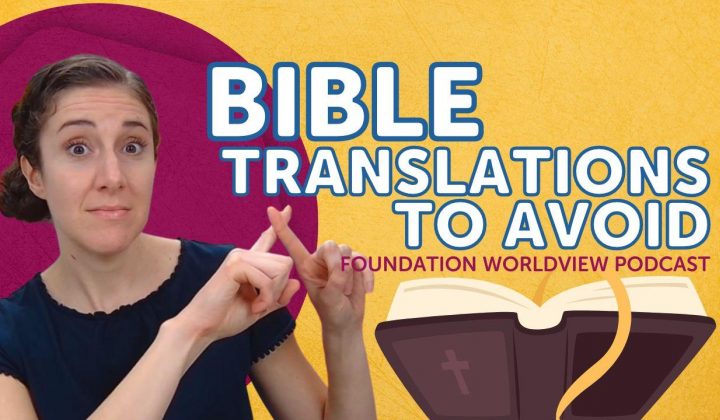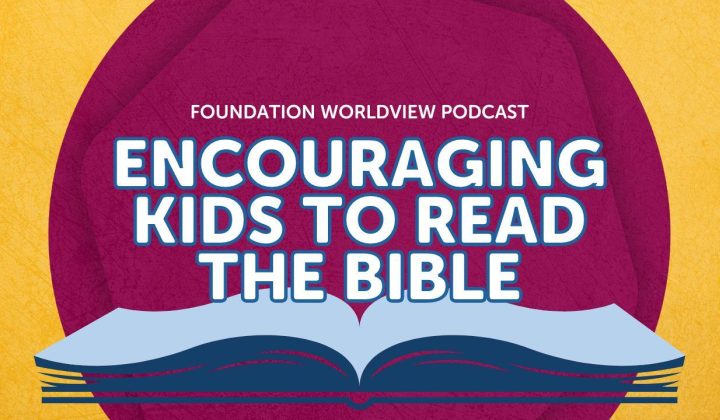Learn more about the journey that led to us equipping kids to carefully evaluate every idea they encounter.
Meet members of our team who have contributed to curriculum development.
Hear from real users of the Foundation Curriculum.
Learn what we believe about God, Jesus, Scripture, and more.
Should Kids Start Reading the Bible in Genesis?
In this episode, Elizabeth Urbanowicz discusses the best starting point for kids reading the Bible. She explores how age, prior exposure to scripture, and reading dynamics factor into this important decision. Listen in for practical tips on fostering a meaningful engagement with the Bible for the young ones in your care.
Resources References:
Transcript
Note: The following is an auto-transcript of the podcast recording.
Hello friends, and welcome to another episode of the Foundation Worldview Podcast where we seek to answer your questions so that you can equip the children that God has placed in your care to carefully evaluate every idea they encounter and understand the truth of the biblical worldview. I'm your host, Elizabeth Urbanowicz, and I'm thrilled that you've joined me today for another episode. Now, today's question is another one that's short and sweet and it says, "Should we have our kids start reading the Bible in Genesis?" Good question. It's an important one for us to think through.
Now, before we dive down deep into that question, as always, I would ask that if you have found the content of this podcast beneficial that you would like and subscribe to make sure that you don't miss any future episodes. Also ask that you would invest the time in writing a review so that more people can find this content and we can equip as many adults as possible to get the kids in their care thinking critically and biblically.
So now this question, when we're having our kids read the Bible, do they need to start in Genesis? And this is an important question, and I'm sure that many of us have thought through this question because often what we'll do is we'll try to pick up a Bible in the year plan and we'll start reading in Genesis and then maybe we'll make it to Exodus. Maybe we might even make it to Leviticus, and then we just start to kind of peter out because those first five books of the Bible, the Pentitude sometimes are really hard to read and understand. So it's important for us to think through, is this the best way for us to have our kids start reading their Bible? So should we begin with them in Genesis?
And my answer to this question depends on a few factors. One, it depends on your kids' ages. If we're talking about a three-year-old reading scripture with a parent, that's very different than talking about a nine-year-old or a 13 year old reading scripture with a parent. It also depends on their familiarity with scripture. Is this a child who's nine who really has only been introduced to storybook Bibles before or is this a child who for the past four or five years, the parents has read scripture to them every evening? Are they already familiar with scripture and how to read scripture? Or is this something that's completely new? It also depends on whether you'll be reading to them or if you'll be reading with them or if they're going to be reading independently, because being read to reading something with someone else and reading independently are all separate activities. So we need to think through all of these different factors.
So my short answer to this question is no, starting in Genesis is not necessary. We can start with another book of the Bible. However, what is necessary is teaching them the biblical timeline, because often what we'll do is we'll just teach our children random isolated Bible stories without ever having them understand the context of when does this take place.
Now, I've shared this story before on other podcasts and webinars that I was very confused about the Bible growing up, that I had this distinct memory of sitting in my Sunday school class and looking at the green and yellow tiles on the floor and thinking, what in the world type of book is the Bible? Some weeks we're learning semi-normal stories about David being anointed king. Then other weeks we're learning about laws like the 10 Commandments. Then other weeks we're learning about good things that we should have in our life, like the fruits of the spirit. Then other weeks we're learning these off the wall bizarre stories like of a donkey talking to its owner or an entire sea being parted and millions of people walking across on dry ground. And I was just like, what in the world type of book is the Bible?
And our kids really need to understand the biblical timeline. And so if you'd like more information just on what is the biblical timeline and how can you help your kids understand it, highly recommend that you check out a webinar that we have previously run at Foundation Worldview called Teaching Kids How to Read the Bible. And we'll put a link to that webinar in the show notes so that you can register for that webinar and get all of that information on how do we actually teach the biblical timeline to our children.
So again, my answer to this question is no, we don't need to start in Genesis, but our kids do need to understand the biblical timeline so that any book of the Bible we're reading to them with them or they're reading independently, they can put that narrative or those commands in the context of when did this take place in Bible history?
So what I'm going to go through now is just my recommendation for what you can do with your kids to help them read the Bible at different ages. If your children are seven years old or younger, even as young as four or three or two would recommend that you just start off by reading the Bible aloud to them so that they just get used to hearing how actual scripture sounds. Now, this doesn't mean that you have to get rid of all of your storybook Bibles or any picture book that has a Bible story, that those are still great and can be valuable, but we want to make sure from a young age that our children are immersed in scripture.
So if any child seven on down, read to them and choose a book that is narrative. If you start off with the book of, let's say Romans, that's a really important book. It's a really heavy theological lift, but there's going to be so much in there that a four-year-old, a three-year-old or two-year-old is not going to understand. That doesn't mean we can never read Romans to our children. However, if we're just starting off, we should start off with a narrative because a narrative is a story and it's something that our kids can more easily be engaged in and visualize the picture in their mind of what is going on.
So a great place to start off is start off with one of the gospels. Start off with one of the gospels, the story of Jesus's life, and read through a gospel with them. If you finish one gospel, you can start with another gospel. If you want to read through a narrative book in the Old Testament, start off with a book like 1 Samuel. That's an exciting book. It's about God's people during the time of the United Kingdom. First when Samuel was the prophet, then when God had Samuel Leno, Saul, then the tension between David and Saul, and then eventually David becoming King. So 1 Samuel is a great book to start off with little ones.
Once you've read through one or two narrative books, that's when you can, if you want to, you can get into one of the epistles or you could start reading Psalms with your kids so that they can understand the different genres. But I just recommend you start off with a narrative book.
Once our kids are eight on up, especially eight to 10 year olds, I would recommend that you read the Bible with them, that you're reading some out loud, they're reading some out loud, and you can even then challenge them to start reading the Bible independently.
I would recommend that you start teaching them some basic Bible study skills and going through one book together at a time. And so you might be thinking, "I don't know, basic Bible study skills." Again, you can check out that webinar, teaching Kids How to Read the Bible. We go into some very specific skills. We also go through some of the skills that are in our Studying the Bible Curriculum, because we have a whole curriculum for kids eight on up that teaches them the skills that they need to independently read, interpret, and apply scripture in a sound way.
But if you're just looking for some quick tips on how to give your kids some idea of how to read the Bible in this eight to 10 range, I would just teach them three main themes. Now, these are not the only themes in the Bible, but they're three themes that we see consistently. And those themes are God's faithfulness, human rebellion, and God's rescue plan.
And so just start reading through a book together, and after every section of scripture, after you're done reading, ask yourselves, okay, where do we see God's faithfulness in this passage? Where do we see humans rebelling against God in this passage? Where do we see any clues for God's plan to rescue humans from their sin? So with these eight to 10 year olds, start off reading the Bible together. Look for these three basic themes of God's faithfulness, human rebellion, and God's rescue plan. And then talk through that and you can eventually give them more of the responsibility to start reading some on their own.
By the time kids are the age of 11, that's when you can really have them start, I mean, even if not before, have them start reading scripture independently and then come together and discuss it as a family or discuss it with you as the parent.
And once kids are 11 on up, one thing I think is really, really important is helping them know how to read different genres in scripture. Because reading a psalm from the Book of Psalms is very different than reading the biography of Jesus in the gospels, which is very different than the instructions that were given in an epistle. So make sure that our older kids know the difference between different genres. This is something that they just automatically learn in school, or they should be learning whether we're homeschooling them or they're going to public or private school and practice reading through different genres. So read through a few psalms one week the next week, read through a gospel, read through an epistle, read through a book of the law, and just talk about what are some of the similarities and differences between these two genres.
Again, if you'd like help in any of these things, helping kids understand the big storyline, the skills that they need to read, interpret, and apply scripture and understanding different biblical genres, check out our Studying the Bible Curriculum because that's the goal, is that by the end of that curriculum, once kids have gone through that curriculum, they will not need Foundation Worldview to be able to read, interpret, and apply scripture. We want to set them on that trajectory of seeking God through his word all the days of their life.
Well, that's a wrap for this episode. But as we leave our time together, my prayer for you is that no matter the situation in which you and the children God has placed in your care, find yourself you would trust that God is working all things together for your good by using all things to conform you more into the image of His Son. I'll see you next time.
Related Posts and insights

Bible Translations to Avoid
What Bible translations should we avoid? In this episode, Elizabeth Urbanowicz looks at translations that we may want to consider avoiding, especially when reading with our children. Listen as she shares tips and insights into translations and why certain translations should be avoided.

How to Study the Bible for Kids and Parents - A Starter’s Guide for Home Discipleship
We need to teach our kids how to fish so they can read, interpret and apply the Bible for themselves.

Encouraging Kids to Read the Bible
In this episode of the Foundation Worldview Podcast, Elizabeth Urbanowicz explores strategies to help children read the Bible independently, using a structured "I do, We do, You do" approach. She shares insights, resources, and personal stories to inspire a lifelong love for Scripture.





